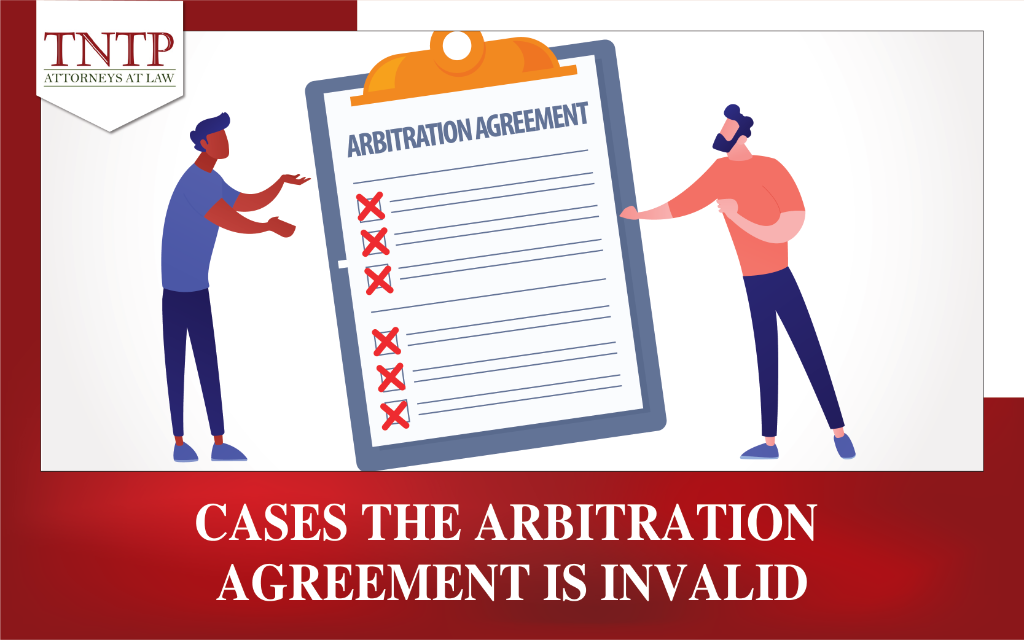In Sale and Purchase Contracts, Principal Contracts, etc., the dispute settlement clause can be stated as “in case the dispute cannot be resolved by negotiation, one of the parties can settle the dispute at Arbitration”. This Agreement is known as the Arbitration Agreement. Currently, many enterprises have chosen to settle disputes by arbitration because of its efficiency, flexibility, and time-saving method. However, due to negligence in the drafting process and the enterprise’s failure to check the legal validity of the Arbitration Agreement, the Arbitration Agreement may be invalid. In this article, we would like to mention and analyze more clearly the null and void Arbitration Agreement.
1. What is an Arbitration Agreement?
- According to the provisions of Clause 2, Article 3 of the Law on Commercial Arbitration 2010, an Arbitration Agreement is an agreement between the parties on the settlement by arbitration of a dispute that may arise or has arisen. Thus, commercial disputes can only be resolved by arbitration only when there is an Arbitration Agreement between the disputing parties. The Arbitration Agreement may be made before, during or after a dispute occurs.
- The Arbitration Agreement is made in writing expressing the will of the parties in dispute settlement.
- The Arbitration Agreement may be represented by an arbitration clause in the contract establishing commercial relations between the parties or in the form of a separate agreement and shall be considered attached to the main contract or evidence determining the will of the parties to settle the dispute by arbitration.
2. When is the Arbitration Agreement invalid?
The Arbitration Agreement will be invalid in the following cases:
- Disputes arising in areas not under the authority of the Arbitration
In order for a dispute to be resolved by Commercial Arbitration and the Arbitration Agreement not to be invalid, the arising dispute must fall within the field of arbitration, including:
– Disputes between parties arising from commercial activities;
– Disputes arising between parties in which at least one party has commercial activities;
– Other disputes between the parties as provided for by law shall be resolved by arbitration.
- The person establishing the Arbitration Agreement has no authority under the law
Normally, the signing of an Arbitration Agreement or Contract will be performed by the legal representative of the enterprise or the authorized representative.
In principle, if an Arbitral Agreement is made by an unauthorized person, such Arbitration Agreement is invalid. In case the Arbitration Agreement is entered into by an unauthorized person, but during the establishment and performance of the Arbitration Agreement or in the arbitration proceedings, the person competent to enter into the Arbitration Agreement has accepted or known it without objection, the Arbitration Agreement is not invalid.
- The person establishing the Arbitration Agreement does not have civil act capacity according to the provisions of the Civil Code
Civil act capacity is understood as the ability of an individual to establish and perform civil rights and obligations by his/her actions. The person establishing the Arbitration Agreement without civil act capacity includes:
- Juvenile.
- Loss of civil act capacity.
- People with difficulty in cognition and behavior control.
- Limited capacity for civil acts.
In this case, the Court needs to collect evidence to prove that the person who established the Arbitration Agreement does not have civil act capacity. It must have documents proving the date of birth or the conclusion of a competent authority or the decision of a competent Court determining or declaring that person has lost his/her civil act capacity or has restricted his/her civil act capacity.
- The form of the Arbitration Agreement is not consistent with the provisions
According to Article 16 of the Law on Commercial Arbitration 2010, the Arbitration Agreement can be established in the form of an arbitration clause in the contract or in the form of a separate agreement. Either way, the Arbitration Agreement must be in writing. The following forms of agreement are also considered to be established in writing:
a) The agreement is established through exchanges between the parties by telegram, fax, telex, email and other forms as prescribed by law;
b) The agreement is established through the exchange of written information between the parties;
c) The agreement is recorded in writing by a lawyer, notary public or a competent organization at the request of the parties;
d) In the transaction, the parties refer to a document showing the arbitral agreement such as a contract, documents, charter of the company and other similar documents;
d) Through an exchange of claims and defenses in which the existence of an agreement is made by one party and not denied by the other.
- One of the parties is deceived, threatened or coerced during the establishment of the arbitral agreement and requests to declare the Arbitration Agreement invalid
This is considered as one of the grounds for the Court to declare the Arbitration Agreement invalid. In civil relations, the parties must be goodwill and honest in establishing and performing civil rights and obligations; neither party may deceive, threaten or coerce the other.
Deception is understood as the intentional act of one party or a third party to mislead the other party about the subject and nature of the Arbitration Agreement, so the Arbitration Agreement has been established.
Threat and coercion are understood as the intentional act of one party or a third person to force the other party to sign the Arbitration Agreement in order to avoid damage to life, health, honor, reputation and dignity, the property of his/her relatives.
- The Arbitration Agreement violates the prohibitions of the law
Prohibitions of the law are provisions of the law that do not allow subjects to perform certain acts.
Above is TNTP’s article on Case of invalid Arbitration Agreement, hope this article is useful for enterprises and readers.
Sincerely,







